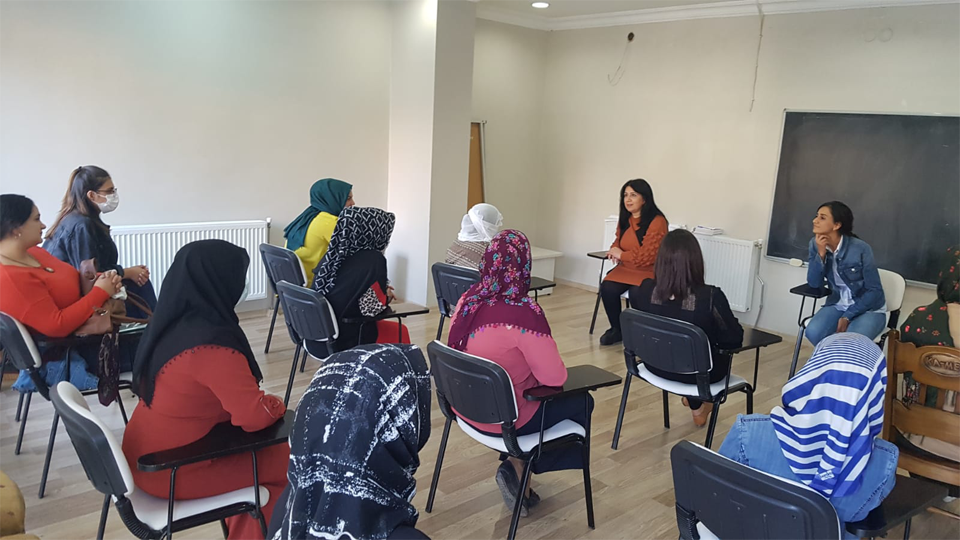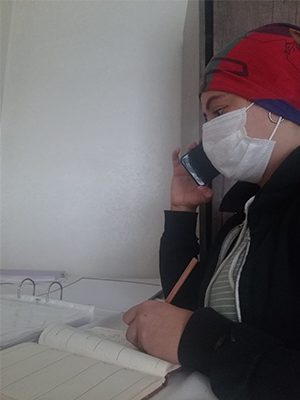Small grants help women in Turkey survive violence and heal its wounds
Violence marks a person. Healing takes time, care and a leap of faith. Survivors of violence share their experiences and how they have found peace through psychological counselling offered during the COVID-19 pandemic by women-led organizations supported under UN Women’s Small Grants programme.
Date:

When her family tried to force her into an arranged marriage, Ayşe Güçlü*, 18, tried to resist. She told them she wanted to study instead, but her father and brothers got violent.
Terrified, she reached out to the Federation of the Women Associations of Turkey (TKDF) – one of the three women-led organizations supported under UN Women’s “Small Grants” programme in Turkey, which is enabling them to provide services to women and girls experiencing violence amid the COVID-19 pandemic.
Although hesitant and scared at first, Güçlü moved into a women’s shelter and started receiving psychological and economic support from TKDF.
“It was the first time that I shared the trauma I experienced with someone,” she recalls. “For the first time in many years, I could sleep with peace of mind at night. I shared. They listened and offered advice.”
Shortly thereafter, Güçlü moved into another women’s shelter in a new city. When she finally felt safe, she started working while studying for the university entrance exam. Güçlü now has a chance to work towards her goals and dreams.
Güçlü is one of the many women who have experienced violence from either an intimate partner or a family member in Turkey. According to a 2014 study by the Ministry of Family, Labour and Social Policies and Hacettepe University[1], 4 out of 10 women in Turkey have experienced physical violence from an intimate partner and/or spouse at least once in their lifetimes. This often has fatal consequences, with 474 women losing their lives as a result of violence in Turkey in 2019 alone.[2]
Levels of domestic and sexual violence spike in times of crises, such as the COVID-19 pandemic, as families living in confined spaces and experience heightened stress related to security, health and finances. Domestic violence is reported to have increased 20–40 per cent[3] in some countries during the pandemic.
Violence ends but the pain remains

Hatice Kahraman*, 33, is a mother of four who was forced into a second marriage with a much older man shortly after the death of her first husband. However, Kahraman and two of her younger children had been repeatedly subjected to physical, psychological and economic violence by her new husband until Kahraman finally decided to reach out to the police and moved into a women’s shelter. Soon after, she filed for divorce.
Although she and her children were safe and far away from violence, she says the psychological pain of her traumatizing experience haunted her new life, keeping her awake at night.
That’s when Kahraman reached out to the KAMER Foundation during the pandemic, another women-led organization in Turkey that is supported under UN Women’s “Small Grants” programme.
“When I received the call, I was at my worst and it felt like my prayers had been heard. I talked about myself a lot, thanks to the guiding questions asked by the psychologist,” explains Kahraman. “The support I received in this trying period made me extremely happy. Our sessions were calm and serene.”
After receiving psychological support, Kahraman started feeling better and putting the violence behind her. She started taking better care of her mental and physical health and spending more quality time with her children. Under UN Women’s Small Grants programme, KAMER Foundation has supported her, along with 150 other women, through psychological and family counselling.
Civil society organizations and women’s organizations in particular provide key assistance, including shelters, counselling, legal aid and helplines that provide information, referrals and support on combating violence against women. Amid mobility restrictions and confinement, some of these services may be obstructed and need to be adapted in order to ensure the safety of both staff and clients and to remain accessible to women exposed to violence – in particular domestic violence.
“The Small Grants Programme aims to strengthen the institutional capacities of women-led organizations experienced in providing services to women and girls who are subjected to violence to ensure the continuity of accessible and quality services in the context of the COVID-19 pandemic,” explains Duygu Erseçen, Project Coordinator, UN Women Turkey.
The Small Grants Programme is supported under the “UN Joint Programme on Prevention of Child, Early and Forced Marriages”, which is generously financed by Sweden through the Swedish International Development Cooperation Agency (SIDA).
*All names of survivors in this article have been changed to protect their identity.
[1] http://www.hips.hacettepe.edu.tr/KKSA-TRAnaRaporKitap26Mart.pdf
[2] http://kadincinayetlerinidurduracagiz.net/veriler/2890/2019-report-of-we-will-end-femicide-platform
[3] https://www.unwomen.org/-/media/headquarters/attachments/sections/library/publications/2020/issue-brief-covid-19-and-ending-violence-against-women-and-girls-en.pdf?la=en&vs=5006